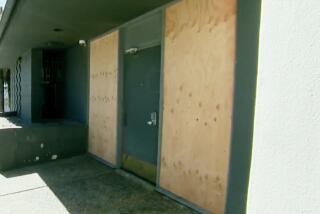Rabbi wounded in synagogue attack becomes global messenger of faith
He had faced a rifle-wielding assassin and witnessed the death of a beloved member of his congregation.
Hours after leaving the hospital, his own wounded hands wrapped in blue bandages, Rabbi Yisroel Goldstein steeled himself to face the national media, delivering an emotional recitation of the tragedy.
Then he was home at last, in the circle of his family. Taking a moment to himself, he ate a quick meal. Then he returned to the rabbi’s duty. There was a sit-down television interview to do, and as soon as it was finished, Goldstein took a long call from a national official of Chabad-Lubavitch, the international Jewish movement that had brought him to Poway more than three decades ago.
Yehuda Krinsky had called to tell him that his news conference had carried Chabad’s words of hope and peace across the world.
“The message from Poway is reaching millions,” Goldstein repeated excitedly to his younger brother Zalman and son-in-law Schneur Polter.
Spreading the message of light prevailing over darkness was more than a small solace for Goldstein, who has dedicated his life to a leader who “professed and taught us the idea of unconditional love.”
To spread that message further, Goldstein consented to one more interview, fighting sleep and pain to tell his story to The Times.
Goldstein said he grew up listening to the teachings of Menachem Mendel Schneerson, the leader who elevated a movement started in a Russian village called Lubavitch into one of the most influential Jewish outreach organizations of the 20th century.
The Rebbe, as he was widely known, himself a Holocaust survivor, addressed “a generation of Holocaust survivors and their families who had abandoned their faith due to their suffering, who saw no future in Judaism,” Goldstein said.
“He embarked on a journey to revive the faith, vitality and the observance of Judaism.”
He did it, Goldstein said, by dispatching his students to “far-flung corners of the world and United States, to cities that didn’t have strong centers of Judaism.”
They were spreading a message described by the Jewish Journal in a tribute to Goldstein as “a joyful, positive vibe that seems to be wired into every Chabad rabbi and rebbitzen.”
As a boy growing up amid the Jewish ferment of the Brooklyn, N.Y., neighborhood of Crown Heights, Goldstein was inspired by the challenge.
“I said, ‘I want to join,’ ” he said. “ ‘I want to go to a city and establish a Jewish presence and attract an assimilated generation and give them a chance to get back to their roots.’ ”
That city would turn out to be Poway, a San Diego suburb that had a growing Jewish population and no synagogue.
Goldstein’s introduction to the West Coast came in 1981, when he worked as a summer camp counselor in San Diego.
“I really enjoyed it,” he said. He came back the following two years.
His path to Poway was blazed by a Kaiser emergency room doctor who had moved there and lobbied Chabad’s San Diego rabbi, Yonah Fradkin, to set up a Chabad center in his community.
Rabbi Fradkin recruited Goldstein for the job. As a 22-year-old, Goldstein jumped at the offer. They sought permission from the Rebbe, who gave his blessing.
Goldstein and the doctor became fast friends and collaborators.
“Together we built the community,” Goldstein said. “We started in a little storefront, and then we found this piece of property. We put trailers there first. We put modular homes.”
In 1996, the permanent synagogue went up. The financing was arranged by a congregation member who was a banker at Wells Fargo.
That congregation member was Lori Gilbert-Kaye, who was gunned down in the synagogue Saturday.
Over the years she had grown close to the Goldstein family, and when Goldstein’s daughter Baila was married in Brooklyn in April, she attended.
With bandaged hands, Goldstein fumbled unsuccessfully on his cellphone searching for a photo. His brother found it for him.
It was a photo of Gilbert-Kaye at the wedding dancing with his daughter in her wedding dress.
“She’s just incredible,” he said, using the present tense.
Struggling to explain his message of hope, arising from such a loss, Goldstein repeatedly used images of light and dark.
He talked about astronomers’ recently revealed photo of a black hole, a place in the cosmos so dark that it sucks in light.
But around it, he said, was a ring of light.
“Our job is to find that light,” he said.
His message from the shooting, intimately bound as it is to the message of Chabad-Lubavitch, is that heroism is needed to find the light.
“The heroism is standing up to evil, standing up to darkness,” he said. “We can’t just be a bystander; we need to be an activist and get out there and be a hero. And light pushes away darkness.”
More to Read
Sign up for Essential California
The most important California stories and recommendations in your inbox every morning.
You may occasionally receive promotional content from the Los Angeles Times.











